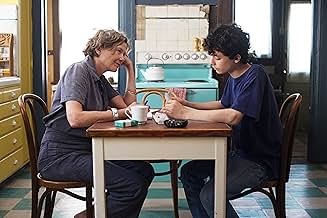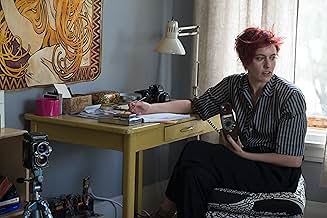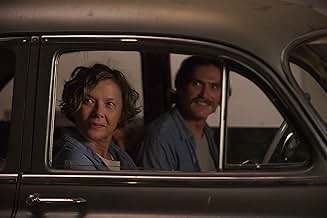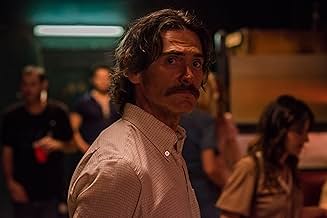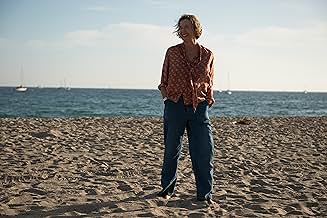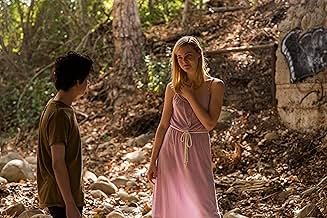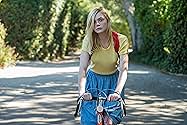20th Century Women
- 2016
- Tous publics
- 1h 59m
In 1979 Santa Barbara, Dorothea is a determined single mother who is raising her son, Jamie. Dorothea enlists the help of two women -- Abbie, a free-spirited punk artist and Julie, a savvy t... Read allIn 1979 Santa Barbara, Dorothea is a determined single mother who is raising her son, Jamie. Dorothea enlists the help of two women -- Abbie, a free-spirited punk artist and Julie, a savvy teenager -- to help with Jamie's upbringing.In 1979 Santa Barbara, Dorothea is a determined single mother who is raising her son, Jamie. Dorothea enlists the help of two women -- Abbie, a free-spirited punk artist and Julie, a savvy teenager -- to help with Jamie's upbringing.
- Nominated for 1 Oscar
- 15 wins & 82 nominations total
Vitaly Andrew LeBeau
- Young Jamie Fields
- (as Vitaly A. Lebeau)
- Director
- Writer
- All cast & crew
- Production, box office & more at IMDbPro
Featured reviews
The status of "too personal" could be its basic virtue. and its sin. because it represents a chronicle. about "80 decade, about family life in large sense, about sexual education and motherhood. and, sure, about freedom. in same measure, it is a film with precise target. remembering independent films, near to every day details too much, it is the film who could be an experience, usuful in profound sense, or just waste of time. but, out of that too easy definitions, it is an admirable work. for script, performances - the kind of film in which each actor seems be the only wise choice for his character - but, first, for Annette Bening who does a magnificent job as middle age mother, in war against her past, insecure about future, without courage to become herself, appentice of her son, discovering the essence of life next her friends. a great film. really !
20th Century Women isn't about giving us some epic look at a group of friends or a family, but it is about the passage of time with people who are warm and caring and in a genuine way. Mike Mills isn't a saccharine filmmaker, but he also doesn't shy away from sentiment - I always have to point out this is separate from sentimentality - and the feeling that I came away with from the comedy 20th Century Women is this warmth from all of the characters, and this feeling that I know these people, whether I did or didn't (and I actually did in the sense that, at times, the mother and son were me and my mom for a short period of my teenage years, so there's an authenticity just there to me).
There's so much empathy for everyone here that it adds to the authenticity of the emotions, even for Greta Gerwig's Abbie who is, in essence, another 'Greta Gerwig' character like I've seen, or think I've seen, in other movies (her quirky wisdom seems akin to last year's Mistress America at least). While she is my least favorite person in this movie, she's given a history and many moments, surrounding one of those terrible things that happens to people and there's not much to be done about it, or could've, it's out of the hands of anything *to* be done. There's so much work done on the characters here by Mills, getting us to like them despite all of their flaws or those moments where they don't act with logic or sense, that it doesn't matter that there isn't too much of a story. This is the story of these characters in a short span of time while also, as if looking on from some other, ethereal plane, about what this time meant in the context of what came before 1979, and what was to come.
Among the actors here, Lucas Jade Zumann is the breakout star as the 15 year old Jamie, but I was so taken with Benning and Fanning as the 50-ish, "she was in the depression" as she's described mother and the 2 years older than Jamie but that matters so much pleutonic friend respectively. I wonder if the film would've worked with any other actors in the roles, but really I can't imagine anyone else. Every time Bening's on screen she gives Dorothea this feeling of 'well... I guess this is happening now, what do I do about it, I'm not sure', and while she can get angry or concerned she's never one to go too over the top - this is the anti-Fences in that regard of being about a kid scarred by a parent - she does care about what happens to her son, with the "inciting incident" in screen writing terms being him almost dying from doing one of those dumb-s*** things teenagers do on a dare. It's a unique and subtle performance, filled with a sense of... questioning, uncertainty, which is harder to pull off than it looks.
Fanning, meanwhile, is also having to underplay, which is good to see. This is an impressive year for her between this, Live by Night (which she was the best part of) and the Neon Demon, and she's different in all of them. I want to say I like the work she does here the most even as (or because) it's the least likable one among the bunch (and keep in mind she's a born-again Christian in the South in LbN). Mills's writing provides Fanning a great deal to make Julie come alive, but I found her not saying things, the way she shows Jamie how to hold a cigarette, when she is saying little, and then when she is backed into doing something that she should want to do but doesn't go for - going past being 'just friends' with Jamie in the last third - how she responds is devastating. It's like, 'no, don't act this way', as opposed to simply looking at her as a "B"-word, which is how a hackier writer could've gone with it.
Oh, and I must reiterate this is a comedy, and it's funny as hell. There's certainly some dramatic stretches, but Mills mines a lot of humor out of generational splits - Bening's face as she hears early Black Flag, and then trying to "move" to it with Billy Crudup, is one of the funniest things this year - and it's a tricky balance that Mills finds between making the feminism (yes, actual literature and quotes spoken in voice-over from essays) serious AND humorous. We don't doubt that the feminism of the characters is pure, but there's also that question that's posed: how much is really appropriate, or can be legitimately understood, by 15 year old who barely knows who he is in this world?
And on top of this Mills is having fun and some daring as a filmmaker, using psychedelic colors to show cars driving at times, and going not for the slow-motion but fast-motion speed, but not for comedy - the aesthetic point matches up with what the movie's about: life moves too fast, and we have to try and keep up with it best as we can and grow with things and become better people as everything moves too quickly. If it's ultimately too episodic to be anything really great or up to be there with the very best this year, I'd still tell anyone who likes smart character independent(ish) movies centered on teenagers and adults to see it immediately; it has a good place alongside The Squid and the Whale and, to a less taboo extent, Diary of a Teenage Girl.
There's so much empathy for everyone here that it adds to the authenticity of the emotions, even for Greta Gerwig's Abbie who is, in essence, another 'Greta Gerwig' character like I've seen, or think I've seen, in other movies (her quirky wisdom seems akin to last year's Mistress America at least). While she is my least favorite person in this movie, she's given a history and many moments, surrounding one of those terrible things that happens to people and there's not much to be done about it, or could've, it's out of the hands of anything *to* be done. There's so much work done on the characters here by Mills, getting us to like them despite all of their flaws or those moments where they don't act with logic or sense, that it doesn't matter that there isn't too much of a story. This is the story of these characters in a short span of time while also, as if looking on from some other, ethereal plane, about what this time meant in the context of what came before 1979, and what was to come.
Among the actors here, Lucas Jade Zumann is the breakout star as the 15 year old Jamie, but I was so taken with Benning and Fanning as the 50-ish, "she was in the depression" as she's described mother and the 2 years older than Jamie but that matters so much pleutonic friend respectively. I wonder if the film would've worked with any other actors in the roles, but really I can't imagine anyone else. Every time Bening's on screen she gives Dorothea this feeling of 'well... I guess this is happening now, what do I do about it, I'm not sure', and while she can get angry or concerned she's never one to go too over the top - this is the anti-Fences in that regard of being about a kid scarred by a parent - she does care about what happens to her son, with the "inciting incident" in screen writing terms being him almost dying from doing one of those dumb-s*** things teenagers do on a dare. It's a unique and subtle performance, filled with a sense of... questioning, uncertainty, which is harder to pull off than it looks.
Fanning, meanwhile, is also having to underplay, which is good to see. This is an impressive year for her between this, Live by Night (which she was the best part of) and the Neon Demon, and she's different in all of them. I want to say I like the work she does here the most even as (or because) it's the least likable one among the bunch (and keep in mind she's a born-again Christian in the South in LbN). Mills's writing provides Fanning a great deal to make Julie come alive, but I found her not saying things, the way she shows Jamie how to hold a cigarette, when she is saying little, and then when she is backed into doing something that she should want to do but doesn't go for - going past being 'just friends' with Jamie in the last third - how she responds is devastating. It's like, 'no, don't act this way', as opposed to simply looking at her as a "B"-word, which is how a hackier writer could've gone with it.
Oh, and I must reiterate this is a comedy, and it's funny as hell. There's certainly some dramatic stretches, but Mills mines a lot of humor out of generational splits - Bening's face as she hears early Black Flag, and then trying to "move" to it with Billy Crudup, is one of the funniest things this year - and it's a tricky balance that Mills finds between making the feminism (yes, actual literature and quotes spoken in voice-over from essays) serious AND humorous. We don't doubt that the feminism of the characters is pure, but there's also that question that's posed: how much is really appropriate, or can be legitimately understood, by 15 year old who barely knows who he is in this world?
And on top of this Mills is having fun and some daring as a filmmaker, using psychedelic colors to show cars driving at times, and going not for the slow-motion but fast-motion speed, but not for comedy - the aesthetic point matches up with what the movie's about: life moves too fast, and we have to try and keep up with it best as we can and grow with things and become better people as everything moves too quickly. If it's ultimately too episodic to be anything really great or up to be there with the very best this year, I'd still tell anyone who likes smart character independent(ish) movies centered on teenagers and adults to see it immediately; it has a good place alongside The Squid and the Whale and, to a less taboo extent, Diary of a Teenage Girl.
"Guys aren't supposed to look like they're thinking about what they look like." Julie (Elle Fanning)
No they're not, but in Mike Mills' 20th Century Women, some rules don't apply, and the young man, Jamie (Lucas Jade Zumann), is well on his way to come of age in a most unusual household. It's 1979, before the Internet and Reagan and after the Punk rage. In other words, it's a time of cultural and personal transition.
No one is more responsible for this cultural migration in the Fields family than Dorothea (Annette Bening), a middle-aged matriarch with wit and lungs that will, in 20 years, surrender to the assault of her incessant smoking (her voice-over narration tells us so). Dorothea has the calm, contemplative, accepting nature to guide her two children, Jamie and Abbie (Greta Gerwig), into a responsible adulthood prefaced by sexual exploration and establishment defiance.
Although I rarely comment on acting, I must single out Bening for a performance of rich nuance, eschewing the theatrics of Oscar baiting to give us a character with immense affection and uncertainty, just like many of us, I suspect. Her low-key but powerful interpretation should get an Oscar nod.
While the examination of teen sexuality in flux is well described, so too is Dorothea's odyssey from a broken marriage to a Zen-like acceptance. As in the iconic Seinfeld world, nothing seems to be happening. However beneath that middle-class ambiance lie hearts struggling with their own shifting shapes under the watchful eye of family.
20th Century Women is all about the overwhelming part family plays in human development, not in grandly dramatic exercises but in the small notes like sitting in bed chatting or going with mother to a nightclub. As the credit sequence will tell you, life turns out fairly well despite the uncertainties of daily vicissitudes documented so distinctly here.
No they're not, but in Mike Mills' 20th Century Women, some rules don't apply, and the young man, Jamie (Lucas Jade Zumann), is well on his way to come of age in a most unusual household. It's 1979, before the Internet and Reagan and after the Punk rage. In other words, it's a time of cultural and personal transition.
No one is more responsible for this cultural migration in the Fields family than Dorothea (Annette Bening), a middle-aged matriarch with wit and lungs that will, in 20 years, surrender to the assault of her incessant smoking (her voice-over narration tells us so). Dorothea has the calm, contemplative, accepting nature to guide her two children, Jamie and Abbie (Greta Gerwig), into a responsible adulthood prefaced by sexual exploration and establishment defiance.
Although I rarely comment on acting, I must single out Bening for a performance of rich nuance, eschewing the theatrics of Oscar baiting to give us a character with immense affection and uncertainty, just like many of us, I suspect. Her low-key but powerful interpretation should get an Oscar nod.
While the examination of teen sexuality in flux is well described, so too is Dorothea's odyssey from a broken marriage to a Zen-like acceptance. As in the iconic Seinfeld world, nothing seems to be happening. However beneath that middle-class ambiance lie hearts struggling with their own shifting shapes under the watchful eye of family.
20th Century Women is all about the overwhelming part family plays in human development, not in grandly dramatic exercises but in the small notes like sitting in bed chatting or going with mother to a nightclub. As the credit sequence will tell you, life turns out fairly well despite the uncertainties of daily vicissitudes documented so distinctly here.
9Lele
I understand the rage of many other US reviewers because this movie is so far from usual Hollywood clichés that it does not even look like an US movie! It seems an European movie. Bergman, Fellini and stuff...
It is NOT boring. It has its pace and it is exacly what it has to be.
I identified myself at different levels. I was born in 1958, just like the main actress (great performance). And like Dorothea I had a daugther when I was in my 40s (she now is 15, like Jamie, Dorothea's son) and I don't know how to talk to her, I don't like much of the music she likes and so on.
I was a teenager in the 70s, so I identified with Jamie, great character: I wish I had one thousandth of his self-consciousness when I was his age!
This movie was oxygen for suffocating US major's movies, after sequels and remakes and CGI shows finally something to think about.
This movie was oxygen for suffocating US major's movies, after sequels and remakes and CGI shows finally something to think about.
The scene feels remarkably familiar – Dorothea (Bening), the matron and saint of a Santa Barbara household circa 1979 leans in on her son Jamie (Zumann) listening to "Fairytale in the Supermarket" by The Raincoats. "They know they sound terrible right?" she says. Abbie (Gerwig), Dorothea's avant-garde lodger interjects; "yeah, but it's like they don't care. They got all this feeling but don't have the tools they need to express it
it all comes out as passion." Dorothea fixates on Abbie's intonation, like listening to language she's only now grasping. She gets it...but then she doesn't.
Much like Abbie's defense of The Raincoats, Dorothea believes she has all the passion to be a proper mother, but she lacks the right tools to support a son who is growing older with each passing moment. She decides to enlist the help of two young women; Julie, Jamie's best friend and crush and Abbie a free spirit who was recently treated for cervical cancer. The only other man in the picture is William (Crudup) a well-meaning former hippie with a gift for mechanics and a passion for pottery. Between them all, the stalwart Dorothea hopes to quietly guide her son through his formative years which pit her depression era approach, to Jamie's recession era resentments. "Don't you need a man to raise another man?" asks Julie. "No I don't think you do." 20th Century Women starts with competing voice-overs and uses a collage approach to convey the surfaces of each character's inner life. The collages are stuffed to the brim with stills of 1930's gloom and 1960's turbulence all set to audio of proto-punk, Jimmy Carter's Malaise Speech and "As Life Goes By" from Casablanca (1942). It's an awkward mix; one that creates an echo chamber of sorts.
That subtle discordance of people talking at and not to each other, runs through the first half of the film. Jamie's coming-of-age story, a volatile mix of stubborn familial resentment and unrequited love clobbers together with Dorothea's own midlife crisis. "I had Jamie when I was 40." Dorothea says; a fact that can help explain Dorothea's free-range parenting approach, but also helps explain why Jamie's sharp insights cut so deep. For a while there it always seems like its Jamie versus Dorothea, pulled apart by an ever widening generational gap.
Then, like responding to the blessing of a wartime parlay, the factions in this film begin to center and calm. It is during this truce that the film begins to really take off, presenting its characters with vibrancy and humanity while flying through a more nuanced story arc. Almost independently both Jamie and Dorothea learn their goals are one in the same and the differences they have are little compared to their mutual respect for time which presents itself in rainbow tinged tracking shots and subtle fast-forwards.
And at the center of 20th Century Women lies the affable Annette Bening who suitably captures the zeitgeist of a generation no longer with us. While most might pigeonhole Dorothea as a madcap eccentric or worse a passive pushover, Bening wisely lets the character's inner strength shine through. Dorothea is unabashedly a one of a kind lady. She invites strangers to dinner, invites herself to punk clubs, leaves early, and then comes back days later alone. She verves uncomfortably with post-sexual revolution mores yet she quietly takes frank conversations about menstruation in stride. She does all this because she knows that with every encounter, every meeting, every stranger there's a chance for exchange.
Of course 20th Century Women is not without its problems. While Bening, Gerwig and Fanning all do wonders in their roles, Zumann fails to endear the young Jamie to the audience in any meaningful way. Part of it is due to the part as it is written. The film is loosely based on the life of director Mike Mills thus Jamie at times feels more like an avatar than a real teenager. Additionally it's ironic that despite constant paraphrasing of feminist literature, 20th Century Women would struggle to pass the Bechdel Test. Our three women characters orbit Jamie's life and analyze his actions and motives like he's the center of their universe.
Yet, while the film uses the wider Women's Liberation movement as window dressing, allowing the external conflicts of the film to melt away to reveal honest internal pain was a stroke of genius. Genius enough to maybe be interpreted as a meta-text on standard storytelling practices being a form of patriarchal oppression. That however is a discussion for another day. 20th Century Women is an artfully rendered film with plenty to say about the passage of time, the commonality between the generation gaps and the unifying love of mother and son.
Much like Abbie's defense of The Raincoats, Dorothea believes she has all the passion to be a proper mother, but she lacks the right tools to support a son who is growing older with each passing moment. She decides to enlist the help of two young women; Julie, Jamie's best friend and crush and Abbie a free spirit who was recently treated for cervical cancer. The only other man in the picture is William (Crudup) a well-meaning former hippie with a gift for mechanics and a passion for pottery. Between them all, the stalwart Dorothea hopes to quietly guide her son through his formative years which pit her depression era approach, to Jamie's recession era resentments. "Don't you need a man to raise another man?" asks Julie. "No I don't think you do." 20th Century Women starts with competing voice-overs and uses a collage approach to convey the surfaces of each character's inner life. The collages are stuffed to the brim with stills of 1930's gloom and 1960's turbulence all set to audio of proto-punk, Jimmy Carter's Malaise Speech and "As Life Goes By" from Casablanca (1942). It's an awkward mix; one that creates an echo chamber of sorts.
That subtle discordance of people talking at and not to each other, runs through the first half of the film. Jamie's coming-of-age story, a volatile mix of stubborn familial resentment and unrequited love clobbers together with Dorothea's own midlife crisis. "I had Jamie when I was 40." Dorothea says; a fact that can help explain Dorothea's free-range parenting approach, but also helps explain why Jamie's sharp insights cut so deep. For a while there it always seems like its Jamie versus Dorothea, pulled apart by an ever widening generational gap.
Then, like responding to the blessing of a wartime parlay, the factions in this film begin to center and calm. It is during this truce that the film begins to really take off, presenting its characters with vibrancy and humanity while flying through a more nuanced story arc. Almost independently both Jamie and Dorothea learn their goals are one in the same and the differences they have are little compared to their mutual respect for time which presents itself in rainbow tinged tracking shots and subtle fast-forwards.
And at the center of 20th Century Women lies the affable Annette Bening who suitably captures the zeitgeist of a generation no longer with us. While most might pigeonhole Dorothea as a madcap eccentric or worse a passive pushover, Bening wisely lets the character's inner strength shine through. Dorothea is unabashedly a one of a kind lady. She invites strangers to dinner, invites herself to punk clubs, leaves early, and then comes back days later alone. She verves uncomfortably with post-sexual revolution mores yet she quietly takes frank conversations about menstruation in stride. She does all this because she knows that with every encounter, every meeting, every stranger there's a chance for exchange.
Of course 20th Century Women is not without its problems. While Bening, Gerwig and Fanning all do wonders in their roles, Zumann fails to endear the young Jamie to the audience in any meaningful way. Part of it is due to the part as it is written. The film is loosely based on the life of director Mike Mills thus Jamie at times feels more like an avatar than a real teenager. Additionally it's ironic that despite constant paraphrasing of feminist literature, 20th Century Women would struggle to pass the Bechdel Test. Our three women characters orbit Jamie's life and analyze his actions and motives like he's the center of their universe.
Yet, while the film uses the wider Women's Liberation movement as window dressing, allowing the external conflicts of the film to melt away to reveal honest internal pain was a stroke of genius. Genius enough to maybe be interpreted as a meta-text on standard storytelling practices being a form of patriarchal oppression. That however is a discussion for another day. 20th Century Women is an artfully rendered film with plenty to say about the passage of time, the commonality between the generation gaps and the unifying love of mother and son.
Did you know
- TriviaDuring rehearsals, the cast was encouraged to bring in music they believed their characters listened to. Then, to encourage familiarity among the cast, there would be a dance party where the only rule was that everyone had to dance and it didn't matter what the song was.
- GoofsDorothea is variously depicted discussing her stock portfolio with her son Jamie, quoting NYSE share prices in decimals, doing this in 1979. However, the switch to decimal from fractional stock prices in the U.S. did not occur until the year 2000.
- ConnectionsFeatured in WatchMojo: Top 10 Movies of 2016 Already Getting Oscar Buzz (2016)
- SoundtracksDon't Worry About the Government
Written by David Byrne
Performed by Talking Heads
Courtesy of Sire Records
By arrangement with Warner Music Group Film & TV Licensing
- How long is 20th Century Women?Powered by Alexa
Details
- Release date
- Country of origin
- Official sites
- Language
- Also known as
- Mujeres del siglo XX
- Filming locations
- East Beach, Santa Barbara, California, USA(Santa Barbara, CA)
- Production companies
- See more company credits at IMDbPro
Box office
- Budget
- $7,000,000 (estimated)
- Gross US & Canada
- $5,664,764
- Opening weekend US & Canada
- $111,200
- Jan 1, 2017
- Gross worldwide
- $7,214,806
- Runtime1 hour 59 minutes
- Color
- Sound mix
- Aspect ratio
- 2.00 : 1
Contribute to this page
Suggest an edit or add missing content








